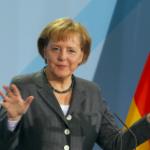Will Merkel's Coalition Hold?
 According to current polls, 62% of Germans (and many pundits) now believe the center-right government that has ruled the country since October 2009 will collapse.
According to current polls, 62% of Germans (and many pundits) now believe the center-right government that has ruled the country since October 2009 will collapse.
Christian Wulff took the oath of office in Berlin this Friday, capping a political cliffhanger for Chancellor Angela Merkel, who narrowly secured an absolute majority for her ruling center-right coalition’s presidential candidate after two inconclusive rounds of voting in the Federal Assembly on Wednesday. While the CDU Minister-President of Lower Saxony could also have been elected German president by virtue of a simple majority in the third and final round of voting, most political pundits agree that the many defectors from within the CDU/CSU-FDP camp (44, 29, and 19 Assemblymen failed to support the Chancellor’s candidate during the first, second, and third votes, respectively) reflect growing frustration and bitterness about Angela Merkel’s weak leadership style.
According to current opinion polls, 62 percent of Germans (and many pundits) now believe that the center-right government that has ruled the country since October 2009 will collapse. However, any rumors about the imminent death of the CDU/CSU-FDP coalition are greatly exaggerated. To the contrary, I am pretty confident that the government will be able to serve out the remainder of its term until 2013. The reason is very simple: Neither the CDU/CSU nor the FDP have an interest in facing angry and disappointed voters right now. The bloodletting among coalition MPs would be massive if early elections were held any time soon. In fact, with the FDP party even now hovering around 4 percent in opinion polls (below the crucial five-percent threshold), Foreign Minister Westerwelle and his 92 fellow FDP Bundestag Members would all be kicked out of parliament. Right now, polls put the SPD (30 percent) and the Greens (17 percent) at a combined 47 percent of the vote – that is, within striking distance of an absolute majority of seats in the Bundestag.
The key challenge for Chancellor Merkel now is to reassert control of her coalition, put an end to the recent nasty political infighting (primarily between FDP and CSU), and to pursue a clearly defined, solutions-oriented policy agenda that promotes fiscal discipline, budget consolidation, and deficit reduction – arguably some of the biggest challenges facing Germany today. The good and rather surprising news for Merkel is that Germans seem to have quickly embraced Christian Wulff as their new president, indicating by a 58-30 percentage point margin that he was ultimately the better candidate compared to Joachim Gauck, his charismatic chief rival supported by the Red-Green camp.
For sure, Wednesday’s cliffhanger vote has put Angela Merkel on the political defensive. With the summer break quickly approaching, Merkel’s best bet now is to hope that Germany beats favorite Argentina tomorrow at the World Cup (she’s traveling to Cape Town to watch the game) and then coasts to victory in the tournament. When I explained Germany’s current political situation to a Canadian friend this week he responded light-heartedly “I see that the fate of Germany’s coalition doesn’t depend on the presidential election, but on Diego Maradona and Lionel Messi!”